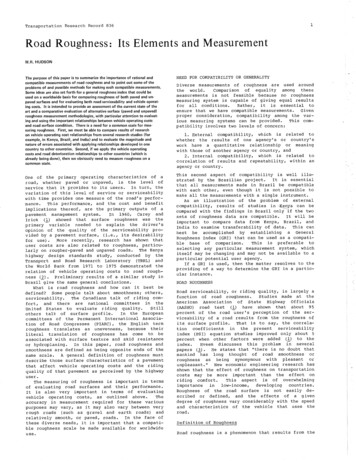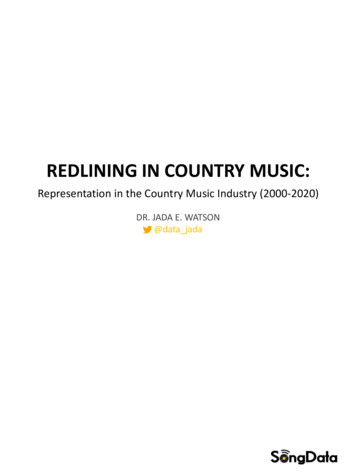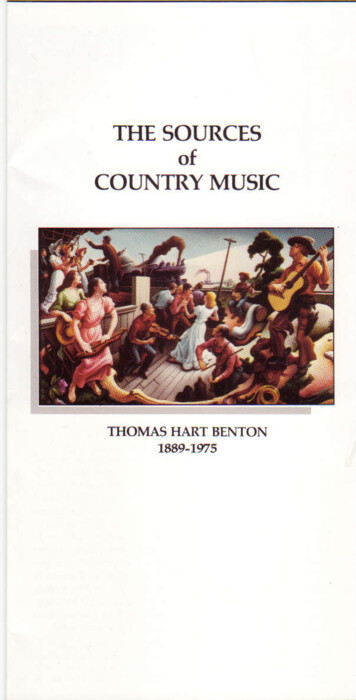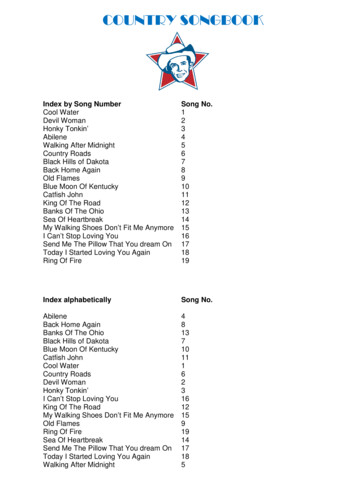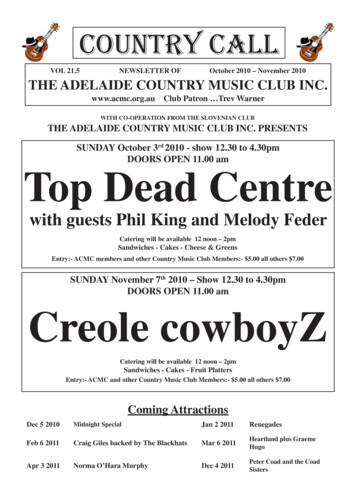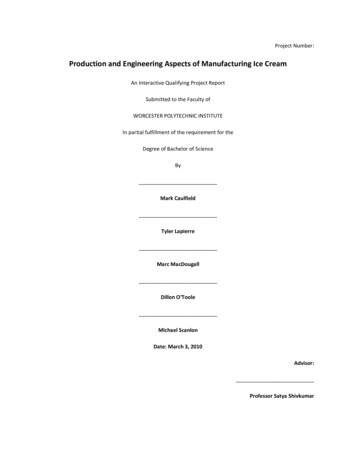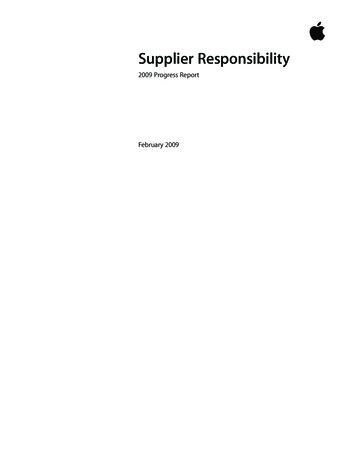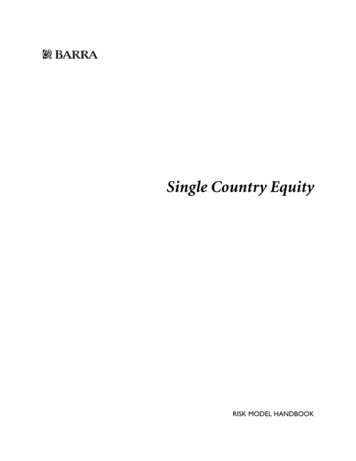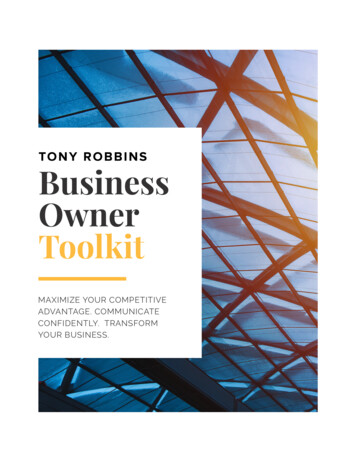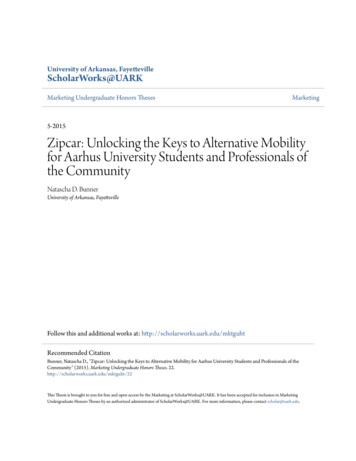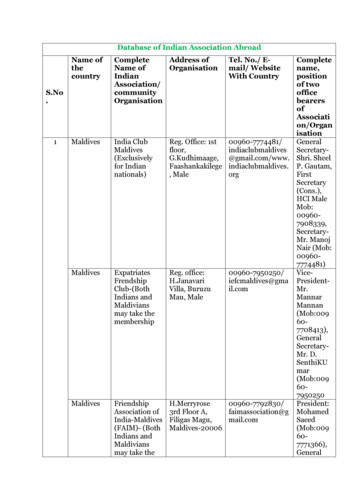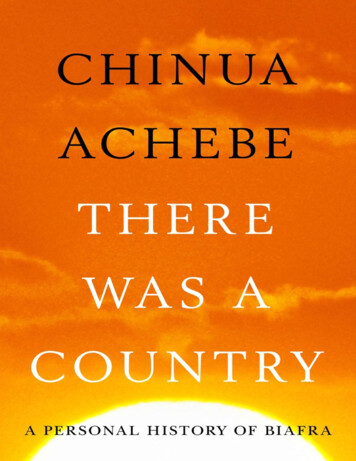
Transcription
ALSO BY CHINUA ACHEBEThe Education of a British-Protected ChildCollected PoemsAnthills of the SavannahThe Sacrificial Egg and Other StoriesThings Fall ApartNo Longer at EaseChike and the RiverA Man of the PeopleArrow of GodGirls at War and Other StoriesBeware Soul BrotherMorning Yet on Creation DayThe Trouble with NigeriaThe FluteThe DrumHome and ExileHopes and ImpedimentsHow the Leopard Got His Claws(with John Iroaganachi)Winds of Change: Modern Short Stories from Black Africa(coeditor)African Short Stories(editor, with C. L. Innes)Another Africa(with Robert Lyons)
THERE WAS A COUNTRYA PERSONAL HISTORY OF BIAFRAChinua AchebeTHE PENGUIN PRESSNew York2012
THE PENGUIN PRESSPublished by the Penguin GroupPenguin Group (USA) Inc., 375 Hudson Street, New York, New York 10014, U.S.A. Penguin Group (Canada), 90 Eglinton AvenueEast, Suite 700, Toronto, Ontario, Canada M4P 2Y3 (a division of Pearson Penguin Canada Inc.) Penguin Books Ltd, 80 Strand,London WC2R 0RL, England Penguin Ireland, 25 St. Stephen’s Green, Dublin 2, Ireland (a division of Penguin Books Ltd) Penguin Group Australia, 707 Collins Street, Melbourne, Victoria 3008, Australia (a division of Pearson Australia Group Pty Ltd) Penguin Books India Pvt Ltd, 11 Community Centre, Panchsheel Park, New Delhi – 110 017, India Penguin Group (NZ), 67 ApolloDrive, Rosedale, Auckland 0632, New Zealand (a division of Pearson New Zealand Ltd) Penguin Books, Rosebank Office Park, 181Jan Smuts Avenue, Parktown North 2193, South Africa Penguin China, B7 Jaiming Center, 27 East Third Ring Road North,Chaoyang District, Beijing 100020, ChinaPenguin Books Ltd, Registered Offices:80 Strand, London WC2R 0RL, EnglandFirst published in 2012 by The Penguin Press,a member of Penguin Group (USA) Inc.Copyright Chinua Achebe, 2012All rights reserved“1966,” “Benin Road,” “Penalty of Godhead,” “Generation Gap,” “Biafra, 1969,” “A Mother in a Refugee Camp,” “The First Shot,”“Air Raid,” “Mango Seedling,” “We Laughed at Him,” “Vultures,” and “After a War” from Collected Poems by Chinua Achebe.Copyright 1971, 1973, 2004 by Chinua Achebe. Used by permission of Anchor Books, a division of Random House, Inc.LIBRARY OF CONGRESS CATALOGING IN PUBLICATION DATAAchebe, Chinua.There was a country : a personal history of Biafra / Chinua Achebe.p. cm.Includes bibliographical references and index.ISBN 978-1-101-59598-51. Achebe, Chinua. 2. Authors, Nigerian—20th century—Biography. 3. Nigeria—History—Civil War, 1967–1970—Personalnarratives. I. Title.PR9387.9.A3Z46 2012823'.914—dc23[B]2012005603No part of this book may be reproduced, scanned, or distributed in any printed or electronic form without permission. Please do notparticipate in or encourage piracy of copyrighted materials in violation of the author’s rights. Purchase only authorized editions.Penguin is committed to publishing works of quality and integrity. In that spirit, we are proud to offer this book to our readers;however, the story, the experiences, and the words are the author’s alone.
CONTENTSAlso by Chinua AchebeTitle PageCopyrightMapsIntroductionPART 1Pioneers of a New FrontierThe Magical YearsA Primary ExposureLeaving HomeThe Formative Years at Umuahia and IbadanTHE UMUAHIA EXPERIENCETHE IBADAN EXPERIENCEMeeting Christie and Her Family
Discovering Things Fall ApartA Lucky GenerationThe March to IndependenceThe Cradle of Nigerian NationalismPost-Independence NigeriaThe DeclineThe Role of the Writer in Africa1966 (poem)January 15, 1966, CoupThe Dark DaysBenin Road (poem)A History of Ethnic Tension and ResentmentThe ArmyCountercoup and AssassinationThe PogromsPenalty of Godhead (poem)The Aburi AccordGeneration Gap (poem)
The Nightmare BeginsPART 2The Nigeria-Biafra WarTHE BIAFRAN POSITIONTHE NIGERIAN ARGUMENTTHE ROLE OF THE ORGANIZATION OF AFRICAN UNITYThe Triangle Game: The UK, France, and the United StatesThe Writers and IntellectualsThe War and the Nigerian IntellectualThe Life and Work of Christopher OkigboThe Major Nigerian Actors in the Conflict: Ojukwu and GowonTHE ARISTOCRATTHE GENTLEMAN GENERALThe First Shot (poem)The Biafran Invasion of the Mid-WestGowon RegroupsThe Asaba MassacreBiafran RepercussionsBlood, Blood, EverywhereThe Calabar Massacre
Biafra, 1969 (poem)The Republic of BiafraTHE INTELLECTUAL FOUNDATION OF A NEW NATIONThe Biafran StateTHE BIAFRAN FLAGTHE BIAFRAN NATIONAL ANTHEMTHE MILITARYOGBUNIGWEBIAFRAN TANKSA TIGER JOINS THE ARMYFREEDOM FIGHTERSTraveling on Behalf of BiafraRefugee Mother and Child (A Mother in a Refugee Camp) (poem)Life in BiafraThe Abagana AmbushAir Raid (poem)The Citadel PressThe Ifeajuna ManuscriptStaying AliveDeath of the Poet: “Daddy, Don’t Let Him Die!”Mango Seedling (poem)Refugees
We Laughed at Him (poem)The Media WarNarrow EscapesVultures (poem)PART 3The Fight to the FinishThe Economic Blockade and StarvationThe Silence of the United NationsAzikiwe Withdraws Support for BiafraThe Recapture of OwerriBiafra Takes an Oil Rig: “The Kwale Incident”1970 and The FallThe Question of GenocideThe ArgumentsThe Case Against the Nigerian GovernmentGowon RespondsPART 4
Nigeria’s Painful Transitions: A ReappraisalCorruption and IndisciplineState Failure and the Rise of TerrorismState Resuscitation and RecoveryAfter a War (poem)Postscript: The Example of Nelson MandelaAppendix: Brigadier Banjo’s Broadcast to Mid-WestNotesIndex
INTRODUCTIONAn Igbo proverb tells us that a man who does not know where the rainbegan to beat him cannot say where he dried his body.The rain that beat Africa began four to five hundred years ago, from the“discovery” of Africa by Europe, through the transatlantic slave trade, to theBerlin Conference of 1885. That controversial gathering of the world’s leadingEuropean powers precipitated what we now call the Scramble for Africa, whichcreated new boundaries that did violence to Africa’s ancient societies andresulted in tension-prone modern states. It took place without Africanconsultation or representation, to say the least.Great Britain was handed the area of West Africa that would later becomeNigeria, like a piece of chocolate cake at a birthday party. It was one of the mostpopulous regions on the African continent, with over 250 ethnic groups anddistinct languages. The northern part of the country was the seat of severalancient kingdoms, such as the Kanem-Bornu—which Shehu Usman dan Fodioand his jihadists absorbed into the Muslim Fulani Empire. The Middle Belt ofNigeria was the locus of the glorious Nok Kingdom and its world-renownedterra-cotta sculptures. The southern protectorate was home to some of theregion’s most sophisticated civilizations. In the west, the Oyo and Ife kingdomsonce strode majestically, and in the midwest the incomparable Benin Kingdomelevated artistic distinction to a new level. Across the Niger River in the East,the Calabar and the Nri kingdoms flourished. If the Berlin Conference sealed herfate, then the amalgamation of the southern and northern protectoratesinextricably complicated Nigeria’s destiny. Animists, Muslims, and Christiansalike were held together by a delicate, some say artificial, lattice.1Britain’s indirect rule was a great success in northern and western Nigeria,where affairs of state within this new dispensation continued as had been thecase for centuries, with one exception—there was a new sovereign, Great
Britain, to whom all vassals pledged fealty and into whose coffers all taxes werepaid.2 Indirect rule in Igbo land proved far more challenging to implement.Colonial rule functioned through a newly created and incongruous establishmentof “warrant chiefs”—a deeply flawed arrangement that effectively confused andcorrupted the Igbo democratic spirit.3Africa’s postcolonial disposition is the result of a people who have lost thehabit of ruling themselves. We have also had difficulty running the new systemsfoisted upon us at the dawn of independence by our “colonial masters.” Becausethe West has had a long but uneven engagement with the continent, it isimperative that it understand what happened to Africa. It must also play a part inthe solution. A meaningful solution will require the goodwill and concertedefforts on the part of all those who share the weight of Africa’s historical burden.Most members of my generation, who were born before Nigeria’sindependence, remember a time when things were very different. Nigeria wasonce a land of great hope and progress, a nation with immense resources at itsdisposal—natural resources, yes, but even more so, human resources. But theBiafran war changed the course of Nigeria. In my view it was a cataclysmicexperience that changed the history of Africa.—There is some connection between the particular distress of war, the particulartension of war, and the kind of literary response it inspires. I chose to expressmyself in that period through poetry, as opposed to other genres.4 My Biafranpoems and other poetry are collected in two volumes—Beware, Soul Brother,Poems (which was published as Christmas in Biafra and Other Poems inAmerica) in 1971 and Collected Poems in 2004. As a group these poems tell thestory of Biafra’s struggle and suffering. I have made the conscious choice tojuxtapose poetry and prose in this book to tell complementary stories, in two artforms.It is for the sake of the future of Nigeria, for our children and grandchildren,that I feel it is important to tell Nigeria’s story, Biafra’s story, our story, my story.I begin this story with my own coming of age in an earlier and, in somerespects, a more innocent time. I do this both to bring readers unfamiliar withthis landscape into it at a human level and to be open about some of the sourcesof my own perspective.
Pioneers of a New FrontierMy father was born in the last third of the nineteenth century, an era of greatcultural, economic, and religious upheaval in Igbo land. His mother had died inher second childbirth, and his father, Achebe, a refugee from a bitter civil war,did not long survive his wife. And so my father was raised by his maternal uncle,Udoh.It was this maternal uncle, as fate would have it, who received in hiscompound the first party of English clergy in his town. The new arrivals,missionaries of a new religion, Christianity, had already “conquered” the Yorubaheartland and were expanding their footprint in Igbo land and the rest ofsouthern Nigeria with their potent, irresistible tonic of evangelism and education.A story is told of how Udoh, a very generous and tolerant man, finally asked hisvisitors to move to a public playground on account of their singing, which heconsidered too dismal for a living man’s compound. But he did not discouragehis young nephew from associating with the singers.1My father was an early Christian convert and a good student. By 1904 hewas deemed to have received enough education at St. Paul’s Teachers College inAwka to be employed as a teacher and an evangelist in the Anglican Mission. Hewas a brilliant man, who deeply valued education and read a great deal—mainlythe Bible and religious books, periodicals, and almanacs from the ChurchMission Society.My mother, Janet Anaenechi Iloegbunam, was an extraordinary woman. As astudent of the legendary missionary and evangelist Miss Edith Warner shereceived a primary school education, which was a phenomenal feat at the time,especially for a woman. My mother joined my father on his travels throughmuch of Igbo land to spread the gospel.My parents were among the first of their people to successfully integratetraditional values with the education and new religion brought by the Europeans.I still marvel at how wholeheartedly they embraced strangers from thousands ofmiles away, with their different customs and beliefs.It is from these two outstanding and courageous individuals that my fivesiblings—Frank, Zinobia, John, Augustine, and Grace—and I got our deep love
for education and the pursuit of knowledge.
The Magical YearsOn November 16, 1930, in Nnobi, near my hometown of Ogidi, providenceushered me into a world at a cultural crossroads. By then, a long-standing clashof Western and African civilizations had generated deep conversations andstruggles between their respective languages, religions, and cultures.Crossroads possess a certain dangerous potency. Anyone born there mustwrestle with their multiheaded spirits and return to his or her people with theboon of prophetic vision, or accept, as I have, life’s interminable mysteries.My initiation into the complicated world of Ndi Igbo1 was at the hands of mymother and my older sister, Zinobia, who furnished me with a number ofwonderful stories from our ancient Igbo tradition. The tales were steeped inintrigue, spiced with oral acrobatics and song, but always resolute in their moralmessage. My favorite stories starred the tortoise mbe, and celebrated hismischievous escapades. As a child, sitting quietly, mesmerized, story time tookon a whole new world of meaning and importance. I realize, reminiscing aboutthese events, that it is little wonder I decided to become a storyteller. Later in myliterary career I traveled back to the magic of the storytelling of my youth towrite my children’s books: How the Leopard Got His Claws, Chike and theRiver, The Drum: A Children’s Story, and The Flute.—When I think about my mother the first thing that comes to my mind is howclearly the description “the strong, silent type” fit her. Mother was neithertalkative nor timid but seemed to exist on several planes—often quietly escapinginto the inner casements of her mind, where she engaged in deep, reflectivethought. It was from her that I learned to appreciate the power and solace insilence.Mother’s education prepared her for leadership, and she distinguished herselfin the church and as the head of a group of expatriate women from the ancienttown of Awka who were married in Ogidi. She always treated others with respectand exuded a calm self-confidence. Mother brought a remarkable, understatedelegance to every activity in which she engaged. She had a particularly attractive
way of making sure she got her point across without being overbearing orintimidating. It is her peaceful determination to tackle barriers in her world thatnailed down a very important element of my development—the willingness tobring about change gently.We were Christians, though the interreligious struggle was still evident in ourtime. There were occasions when one would suddenly realize there were sides,and one was on one or another. Perhaps the most important event that illustratesthis was what has come to be known in my family as the “Kola nut incident.”The story came out that a neighbor who was a relative of mine and someonethe Christians would refer to as “a heathen,” was passing on the road one dayand watched quietly as my mother pulled down a small Kola nut branch from atree in her compound and picked a ripe fruit. Now one often forgot that therewere taboos about picking Kola nuts. Traditionally no one was allowed to pickthem from the tree; they were supposed to ripen, fall, and then be collected fromthe ground, and by men—not by women. The Kola nut was a sacred fruit andhad a very distinct and distinguished role to play in Igbo life and culture.The neighbor reported this incident to the menfolk, who then exaggerated the“insult to our traditions.” But Mother insisted that she had every right to pick thefruit, particularly from a tree in her own compound. I did not think up to thatmoment that my mother was a fighter. There was pressure to punish my mother,though it did not go anywhere in the end. Looking back, one can appreciate thefact that she had won a battle for Christianity, women’s rights, and freedom.The most powerful memories of my father are the ones of him working as acatechist and a teacher. He read constantly and had a small library. My fatheralso had a number of collages and maps hanging on the walls, and books that heencouraged his children to read. He would often walk us through the housetelling stories linked to each prized possession. It was from him that I wasexposed to the magic in the mere title of William Shakespeare’s A MidsummerNight’s Dream and to an Igbo translation of John Bunyan’s The Pilgrim’sProgress.The Bible played an important role in my education. My parents often readpassages out loud to us during prayer time and encouraged us, when we were allable, to read and memorize several passages. Sunday school continued thistradition of Christian evangelical education, this time with several other childrenfrom the village. Education was so important to my father that he often wouldsponsor a bright child from an underprivileged background, reminding us that hetoo, as an orphan, had received providence’s benefaction.
The center of our family’s activities was St. Philip’s Church, Ogidi, a largeGothic-style parish church that my father helped establish. It was constructed onan impressive, open ilo, or piece of open grass, on the outskirts of Ogidi. It wasan imposing structure for its time, built with wood, cement, mud, and stone.Local lore holds that my father took part in the building of the church from itsfoundations. My father also helped conduct Sunday service, translate sermonsinto Igbo, and arrange the sanctuary and vestry. I remember waking up early tohelp out, carrying his bag for him as we set out at cock crow for the parishchurch.Eucharist on Sundays often lasted more than two hours. For those who werenot asleep by the end of the proceedings, the fire and brimstone sermons fromthe pulpit made attendance worthwhile. There was an occasional outburst ofuncontrollable laughter, when the rector, an Englishman, enthusiastically drankall the remaining wine at the end of communion, wiping his mouth with the backof his hand. A crowd favorite was the inaccurate translations of Igbo words intoEnglish, such as the word ike, which is an Igbo word that can mean “strength” or“buttocks” depending on the skill or mischief of the translator!I can say that my whole artistic career was probably sparked by this tensionbetween the Christian religion of my parents, which we followed in our home,and the retreating, older religion of my ancestors, which fortunately for me wasstill active outside my home. I still had access to a number of relatives who hadnot converted to Christianity and were called heathens by the new converts.When my parents were not watching I would often sneak off in the evenings tovisit some of these relatives. They seemed so very content in their traditionalway of life and worship. Why would they refuse to become Christians, likeeveryone else around them? I was intent on finding out.My great-uncle, Udoh Osinyi, was able to bestride both worlds with greatcomfort. He held one of the highest titles in all of Igbo land—ozo. I was veryinterested in my great-uncle’s religion, and talking to him was an enrichingexperience. I wouldn’t give up anything for that, including my own narrow, ifyou like, Christian background.In Igbo cosmology there are many gods. A person could be in good steadwith one god and not the other—ogwugwu could kill a person despite anexcellent relationship with udo. As a young person that sort of complexity meantlittle to me. A later understanding would reveal the humility of the traditionalreligion with greater clarity. Igbo sayings and proverbs are far more valuable tome as a human being in understanding the complexity of the world than the
doctrinaire, self-righteous strain of the Christian faith I was taught. This otherreligion is also far more artistically satisfying to me. However, as a catechist’sson I had to suppress this interest in our traditions to some extent, at least thereligious component. We were church people after all, helping the local churchspread Christianity.The relationship between my father and his uncle Udoh was instructive tome. There was something deep and mystical about it, judging from the reverenceI heard in my father’s voice whenever he spoke about his old uncle.My father was a man of few words, and I have always regretted that I did notask him more questions. But he took pains to tell me what he thought I needed toknow. He told me, for instance, in a rather oblique way of his one attempt toconvert his uncle Udoh. It must have been in my father’s youthful, heady,proselytizing days! His uncle pointed to the awesome row of insignia of his threetitles—ichi ozo, ido idemili, ime omaalor. “What shall I do to these?” he askedmy father. It was an awesome question. He had essentially asked: “What do I doto who I am? What do I do to history?”An orphan child born into adversity, heir to the commotions, barbarities, andrampant upheavals of a continent in disarray—it was not at all surprising that myfather would welcome the remedy proffered by diviners and interpreters of anew word of God. But my great-uncle, a leader in his community, a moral, openminded man, a prosperous man who had prepared such a great feast when hetook the ozo title that his people gave him a praise name for it—was he to throwall that away because some strangers from afar had said so?At first glance it seemed to me that my father, a deeply religious man, wasnot tolerant of our ancient traditions and religion. As he got older, however, Inoticed that he became more openly accommodating of the old ways of doingthings. By this time he had developed quite a reputation as a pious, disciplined,honest catechist. He was widely known as onye nkuzi (“the teacher”), and thevillagers found him very trustworthy. Strangers would often drop off valuables atour house for Father’s safe-keeping.Those two—my father and his uncle—formed the dialectic that I inherited.Udoh stood fast in what he knew, but he also left room for my father to seekother answers. The answer my father found in the Christian faith solved manyproblems, but by no means all.As a young person my perspective of the world benefited, I think, from thisdichotomy. I wasn’t questioning in an intellectual way which way was right, orbetter. I was simply more interested in exploring the essence, the meaning, the
worldview of both religions. By approaching the issues of tradition, culture,literature, and language of our ancient civilization in that manner, withoutjudging but scrutinizing, a treasure trove of discovery was opened up to me.I often had periods of oscillating faith as I grew older, periods of doubt, whenI quietly pondered, and deeply questioned, the absolutist teachings or theinterpretations of religion. I struggled with the certitude of Christianity—“I amthe Way, the Truth and the Life”—not its accuracy, because as a writer oneunderstands that there should be such latitude, but the desolation, the acerbity ofits meaning, the lack of options for the outsider, the other. I believe that thisquestion has subconsciously deeply influenced my writing. This is not peculiaror particularly unique, as many writers, from Du Bois to Camus, Sartre andBaldwin to Morrison, have also struggled with this conundrum of the outsider,the other, in other ways, in their respective locales.My father had a lot of praise for the missionaries and their message, and sodo I. I am a prime beneficiary of the education that the missionaries made amajor component of their enterprise. But I have also learned a little moreskepticism about them than my father had any need for. Does it matter, I askmyself, that centuries before European Christians sailed down to us in ships todeliver the Gospel and save us from darkness, other European Christians, alsosailing in ships, delivered us to the transatlantic slave trade and unleasheddarkness in our world?Every generation must recognize and embrace the task it is peculiarlydesigned by history and by providence to perform. From where I stand now I cansee the enormous value of my great-uncle, Udoh Osinyi, and his example offidelity. I also salute my father, Isaiah Achebe, for the thirty-five years he servedas a Christian evangelist and for all the benefits his work, and the work of otherslike him, brought to our people. My father’s great gift to me was his love ofeducation and his recognition that whether we look at one human family or welook at human society in general, growth can come only incrementally.
A Primary ExposureI began my formal education at St. Philip’s Central School, in 1936 orthereabout. The school had pupils from Ogidi and the surrounding towns. Mostwho attended classes there had to walk alone several miles every day to get toschool. But things were simpler and safer in those days, and there was never astory of child abductions or any unsavory incidents that I can recall.I enjoyed school a great deal and was a hardworking pupil. I rememberlooking forward excitedly to new lessons and information from our teachers.Occasionally we received instruction from individuals who were not on the staffof St. Philip’s. One particular, humorous event stands out: On a hot and humidday during the wet season our geography teacher decided to move our entireclass outside to the cool shade of a large mango tree. After setting up theblackboard he proceeded to give the class a lesson on the geography of GreatBritain. The village “madman” came by, and after standing and listening to theteacher’s lesson for a short while, walked up to him, snatched the chalk from hishand, wiped the blackboard, and proceeded to give us an extended lesson onOgidi, my hometown.Amazingly, the teacher let all this take place without incident. Looking back,it is instructive, in my estimation, that it was a so-called madman whose “clarityof perspective” first identified the incongruity of our situation: that the pupilswould benefit not only from a colonial education but also by instruction abouttheir own history and civilization.—The headmaster of St. Philip’s Central School was a colorful, extraordinary Igboman—Jonathan Obimdike Okongwu. He was also known as: Ara eme ya eme nauno akwukwo Okongwu or Ara eme ya eme, for short.1 He was one of a handfulof Nigerians who had attained the distinction of headmaster of an elementaryschool. His reputation as a disciplinarian sent chills down the spines of all pupilsthroughout the Eastern Region. St. Philip’s school lore holds that he oncespanked every pupil in every class in each form of the entire school in one day—and continued the very next day where he left off!2 Okongwu’s unorthodox
methods produced top scores on exams, which placed his students in the bestboarding schools throughout West Africa, and made him one of the most soughtafter headmasters in the entire region.3Okongwu was transferred to St. Michael’s School, Aba, a well-regardedschool in one of the largest commercial cities in eastern Nigeria. Chike Momahand Dr. Francis Egbuonu, who later became students at Government College,Umuahia, completed their elementary school education there. My wife, ChristieOkoli, for a brief period, also attended that school. Christie recalls being the onlyone in her class to evade Mr. Okongwu’s cane during a spelling lesson. The wordthat produced a score of sore bottoms was “because.” For every word missed thepupil was “rewarded” with a spanking. The majority of the pupils came up with“becos, becus, or becoz.” They never forgot how to spell because ever again.Okongwu was a pillar of the Igbo community for his time. He wasextensively admired for his achievements in education. It is difficult to conveyjust how important teachers like Okongwu, who were seriously committed totheir work, were to the Igbo community, particularly as that is no longer the casetoday. Education, the white man’s knowledge, was a collective aspiration of theentire community. It was the path to individual and family success, andheadmaster Okongwu and others like him held the proverbial keys to thekingdom.Okongwu was a generous man and sponsored a number of children invarious schools in Nigeria and abroad. There is a well-known story of how hesent one of his nephews to America to study. He clearly had great expectationsfor his nephew. In those days, men like Okongwu, who had the means, sentfamily members abroad to advance their education with the hope that they wouldreturn and improve the standard of living of their family and community.Apparently this nephew did quite well and earned his PhD. Sadly, just before hereturned to Nigeria, he became quite ill and died. Okongwu was devastated.4The last time I saw Okongwu was at the train station in Enugu, the capital ofthe Eastern Region. He came there to see his son Sonny Chu Okongwu off toGovernment College, Umuahia. He was standing, leaning on the railing with hisright hand holding on to the bars. He spotted me from a distance and called meover, introduced me to his son, and asked me to “take care of Sonny atGovernment College.” It struck me that the senior Okongwu appeared unhappy.The loss of his nephew clearly had taken a lot out of him.
Leaving HomeFor a brief period I spent some time living with my older brother John, who wasworking at Central School, Nekede, as a teacher. My father had wanted John tofollow in his footsteps and become a teacher too. John was a gifted student andsuccessfully fulfilled that dream.It was John who, quite wisely, thought my own education would be enhancedif I lived with him in a school environment. So I packed up my few belongingsand set out with my older brother to Nekede, near the present capital of Imostate, Owerri, about forty-three miles from my ancestral home of Ogidi. Thatwas the first year I spent away from my parents, and at the time Nekede seemedlike a distant country.John enrolled me in Central School, where I prepared for my entranceexamination into Government College. The regional center for the exam was St.Michael’s School, and John helped me make the trip from Nekede to Aba.Before I arrived Okongwu apparently announced to the students of St.Michael’s, in Igbo: “Onwe nwa onye Ogidi ana akpo Alber
Discovering Things Fall Apart A Lucky Generation The March to Independence The Cradle of Nigerian Nationalism Post-Independence Nigeria The Decline The Role of the Writer in Africa 1966 (poem) January 15, 1966, Coup The Dark Days Benin Road (poem) A History of Ethnic Tension and Rese
